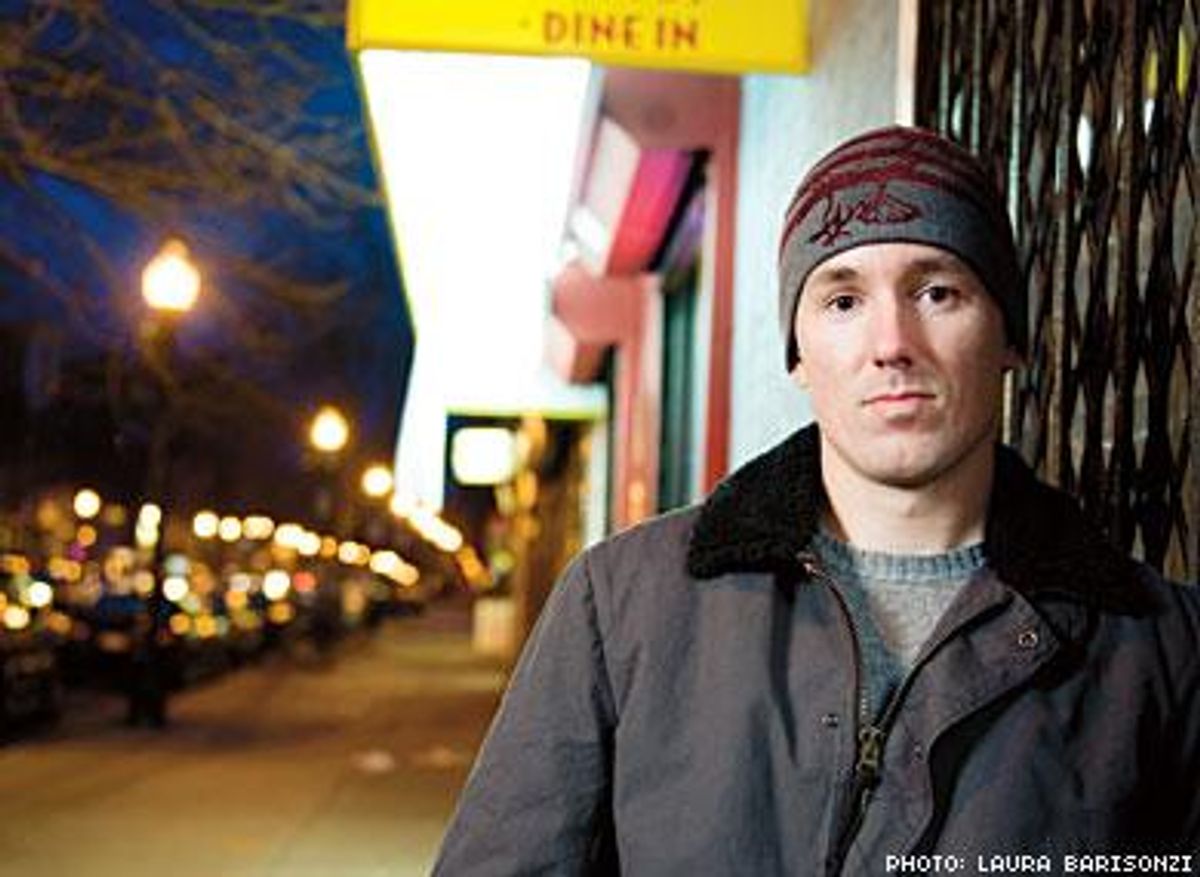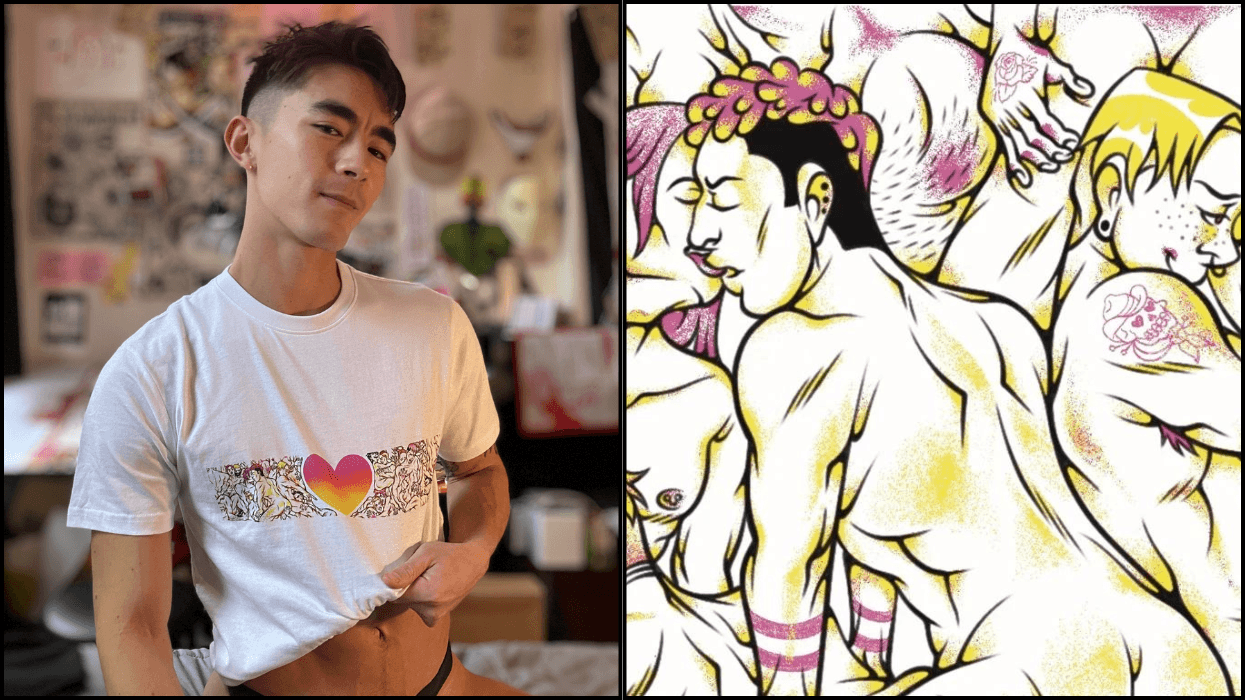
Benoit Denizet-Lewis is known for his stories on gay America. With his debut book he comes out of his own closet -- with his addiction to sex.
January 05 2009 12:00 AM EST
November 17 2015 5:28 AM EST
By continuing to use our site, you agree to our Private Policy and Terms of Use.

Benoit Denizet-Lewis is known for his stories on gay America. With his debut book he comes out of his own closet -- with his addiction to sex.
I first met Benoit Denizet-Lewis in 2003, when he loped into my graduate feature writing class at Emerson College in Boston sporting a baseball hat and a tuft of goatee on his chin. He was 28 (four years younger than I was), had graduated from Northwestern University's Medill journalism school six years earlier, and had recently created a stir among the city's tonier circles with a feature in Boston magazine on the North American Man/Boy Love Association, commonly known as NAMBLA. Realizing he was going to be my professor for the next 13 weeks wasn't exactly like learning Doogie Howser would be performing my appendectomy -- but it was close.
On the scale of wunderkinds, Denizet-Lewis lies somewhere between Billy Strayhorn (pure prodigy) and Christian Siriano (lucky bastard). He was 27 when his work first appeared in The New York Times Magazine: the story of M., a 13-year-old girl secretly living as a boy in Southern California. In the six years since, his articles on gay culture, gender identity, masculinity, and sexual proclivity -- including the seminal piece "Double Lives on the Down Low" -- have landed him on the cover of that publication five times. His magazine writing, which Gawker describes as "designed to scare the hell out of people," has garnered him numerous awards, fellowships, and two nominations for the Livingston Award, which honors journalists under 35. Oh, and he speaks fluent French.
In his first book, America Anonymous: Eight Addicts in Search of a Life, which hit shelves this January and shadows eight people recovering from compulsive relationships with everything from drugs and alcohol to food and shoplifting, Denizet-Lewis reveals he's more than just an infuriatingly successful writer -- he's also a sex addict.
"I do not jump with joy at the fact that I'm coming out publicly," he says today. "But I did decide to write a book about addiction, and one of my main points is that there is too much shame keeping people from getting the help they need. I could not in good conscience not talk about my own addiction."
A brief pass through Denizet-Lewis's catalog of stories shows a similar tendency toward self-revelation. Some, like his Salon.com profile on Abercrombie & Fitch CEO Mike Jeffries, hardly seem a stretch -- what gay man doesn't have some familiarity with A&F? Others, however, are downright confessional. Take his 2005 feature in The New York Times Magazine about life at Northwestern's Phi Delta Theta fraternity, where he was a brother in the late '90s. Woven among tales of hazing and debauchery is the matter-of-fact announcement to the magazine's 1.5 million readers that he is gay. "I thought it worked for the story," Denizet-Lewis says. And it does, but it's not hard to imagine that his very public self-outing exorcised a few demons along the way.
As he's part of a culture that often prides itself on its heightened sexuality and liberation, it's not surprising that it took Denizet-Lewis a while to accept that his sex life was out of control. After years of denying to himself that he is gay, he came out in the summer between his sophomore and junior year of college. At home in San Francisco, where he'd grown up the only child of parents who divorced when he was 6, he did what many gay men do after coming out: "I started dating guys, went out to bars and clubs. I was just having fun meeting people. [Sex] didn't feel addictive to me at that point," he says. But things changed quickly the following autumn when a classmate introduced him to AOL chat rooms where -- at least in 1996 -- "all the hot guys were."
"People talk about the Internet as being the crack cocaine of sex addiction," Denizet-Lewis says. "And it really was a quick and powerful addictive medium for me. It was this constant stream of validation and means of escape from the real world. In my addictive mind, it became more important what complete strangers thought of me than what people who knew me well did."
That lesson would resonate profoundly when Denizet-Lewis was 25 and living with his boyfriend back in San Francisco. "Intimate sex with someone who loved me and who I genuinely cared about was much less exciting," he says. "That would explain why one minute I could be lying in bed with a beautiful man who wanted to be close and intimate -- and the next minute I could be off in the stairwell having phone sex." That'd also explain why, given the choice between having dinner with friends and scouring online for someone to hook up with, he more often chose the computer. And why he wouldn't think anything of driving 100 miles to meet up with a perfect stranger. "It was starting to become clear to me that I had a dysfunctional relationship with sex," he says.
While the concept of free love may be common in gay culture, Denizet-Lewis, who now lives in Boston, is quick to point out that copious and casual sex does not make one an addict. "Sex addiction isn't about the sex. I don't think I'm any more horny or sexual than someone who isn't an addict," he explains. "It became the best way for me to not feel -- to feel numb -- and get this validation I desperately needed and wanted." Furthermore, he makes no judgment on whether having sex with multiple partners in a week or regular visits to the bathhouse are a problem. "But it's not always easy to know what's addiction and what's garden-variety urban gay sexual excess," he says. "I struggled with that a lot--the feeling that since I'm gay and in my 20s, I'm supposed to have sex all the time. But I can't necessarily do what other gay men are able to do. An alcoholic can't just have a drink with their friends." For sex addiction, recovery isn't as clear-cut as it is for, say, crystal meth -- because the goal isn't abstinence. Like food addiction -- which is illuminated in America Anonymous through Ellen, a 51-year-old DJ -- sex involves an essential human drive, and recovery means learning how to wrangle it into a healthy relationship.
That's something Denizet-Lewis deals with regularly through 12-step meetings, meditation, and his writing. Next up for him on the work front is a bound collection of his published stories, due out in January 2010, which in retrospect may reflect more than just the early accomplishments of an overachiever. "My goal is always to write honestly about what I see, and be honest about where I'm coming from at the same time," Denizet-Lewis says. "And if I have the opportunity to educate, that's great."
Want more breaking equality news & trending entertainment stories?
Check out our NEW 24/7 streaming service: the Advocate Channel!
Download the Advocate Channel App for your mobile phone and your favorite streaming device!

